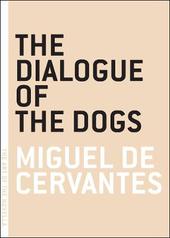
|
The Dialogue Of The Dogs
Paperback / softback
Main Details
| Title |
The Dialogue Of The Dogs
|
| Authors and Contributors |
By (author) Miguel de Cervantes
|
| Series | Art of the Novel |
|---|
| Physical Properties |
| Format:Paperback / softback | | Pages:105 | | Dimensions(mm): Height 178,Width 127 |
|
| Category/Genre | Classic fiction (pre c 1945) |
|---|
| ISBN/Barcode |
9781933633046
|
| Classifications | Dewey:FIC |
|---|
| Audience | |
|---|
|
Publishing Details |
| Publisher |
Melville House Publishing
|
| Imprint |
Melville House Publishing
|
| Publication Date |
1 March 2008 |
| Publication Country |
United States
|
Description
THE ART OF THE NOVELLA SERIES The first talking-dog story in Western literature-from the writer generally acknowledged, alongside William Shakespeare, as the founding father of modern literature, no less? Indeed, The Dialogue of the Dogs features, in a condensed, powerful version, all the traits the author of Don Quixote is famous for- It's a picaresque rich in bawdy humor, social satire, and fantasy, and it uses story tactics that were innovative at the time, such as the philandering husband who, given syphilis by his wife, is hospitalized. Late one feverish night he overhears the hospital's guard dogs telling each other their life's story-a wickedly ironic tale within the tale within the tale, wherein the two virtuous canines find themselves victim, time and again, to deceitful, corrupt humanity. Here in a sparkling new translation, the parody of a Greek dialogue is so entertaining it belies the stunningly prescient sophistication of this novella-that it is a story about telling stories, and about creating a new way to discuss morality that isn't rooted in empiricism. In short, it's a masterful work that flies in the face of the forms and ethics of its time...and perhaps ours as well.
Author Biography
MIGUEL DE CERVANTES was born in Alcala de Henares, Spain in 1547, the son of an impoverished barber-surgeon who may have been a minor noble-or posed as one. Little is known of Cervantes' life until, at 23, he went to Italy-by some accounts, fleeing justice after a duel-to join Spain's war against the Ottoman Empire, losing his left arm in the Battle of Lepanto. Sailing home, he was captured by Barbary pirates and sold into slavery in Algiers. Eventually ransomed by his family, he returned home in 1580 deeply in debt to his rescuers. He published an unsuccessful novel, La Galatea, married a woman twenty years his junior and, denied permission to emigrate to the New World, became a tax collector. Subsequently, he was imprisoned at least twice for account "irregularities." During one of those imprisonments-in La Mancha-he conceived a satire of chivalry that became his masterwork, Don Quixote. It gained widespread popularity and notoriety for its unprecedented use of vernacular Spanish, and for defying the tenets of the long dominant Romantic genre. His subsequent collection, Exemplary Novellas, gained even greater acclaim in 1613. Success allowed him to retire to Madrid to write, and he completed a final novel, The Exploits of Persiles and Sigismunda three days before he died on April 23, 1616-the same day as William Shakespeare.
Reviews"I wanted them all, even those I'd already read." -Ron Rosenbaum, The New York Observer "Small wonders." -Time Out London "[F]irst-rate...astutely selected and attractively packaged...indisputably great works." -Adam Begley, The New York Observer "I've always been haunted by Bartleby, the proto-slacker. But it's the handsomely minimalist cover of the Melville House edition that gets me here, one of many in the small publisher's fine 'Art of the Novella' series." -The New Yorker "The Art of the Novella series is sort of an anti-Kindle. What these singular, distinctive titles celebrate is book-ness. They're slim enough to be portable but showy enough to be conspicuously consumed-tiny little objects that demand to be loved for the commodities they are." -KQED (NPR San Francisco) "Some like it short, and if you're one of them, Melville House, an independent publisher based in Brooklyn, has a line of books for you... elegant-looking paperback editions ...a good read in a small package." -The Wall Street Journal
|